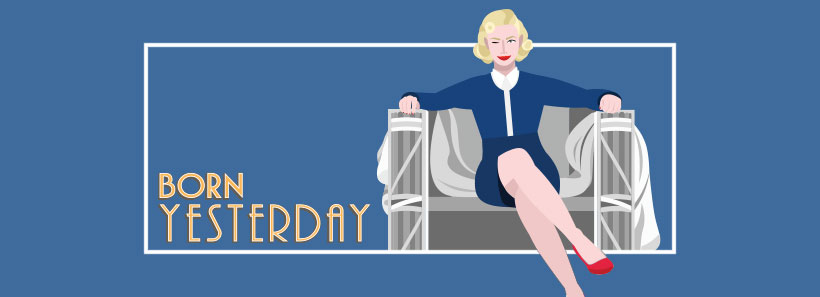
Bill English, Artistic Director
Why Born Yesterday? Why now? Why this American classic by the great Garson Kanin which served as a vehicle to birth the stardom of Judy Holliday? First produced in 1946, it was subsequently turned into an Academy Award-winning film, winning a total of 5 Oscars—including one for Ms. Holliday. We think of it in retrospect as one of those great American comedies keeping company with The Philadelphia Story, It Happened One Night, Harvey and Adams Rib—literate and frothy pieces, whose primary purpose was diversion.
This analysis misses much of what Mr. Kanin was really up to when he conceived of Born Yesterday. He was writing about something no less important than the danger of a dictatorship in the United States. 1946 was also the year the House Un-American Activities Committee was formed and Joseph McCarthy started going after playwrights, screenwriters and journalists including Mr. Kanin, whose career was damaged by the attacks from the HUAC. When he wrote the play, he imagined Harry Brock as the type of person who could go after power in Washington, bribing and intimidating corruptible politicians and undermining the forces of democracy. I wish we had access to earlier drafts of the play in which these themes were more clearly laid out, but the requirements of producing on Broadway were such that the more overtly political themes ended up being submerged under the glitzy wrappings of romantic comedy.
And what did Mr. Kanin propose would be the antidote to corrupt, power-grabbing, foul-mouthed perverters of the constitution? An informed citizenry. Billie, our chorus girl, is not so much transformed into a more successful social self, as she is awakened to her responsibilities as a citizen. She makes that wonderful journey from ignorance to enlightenment, opening her eyes to the brilliance and the frailty of our constitution, and to the knowledge that only the citizens can keep us safe from those who would subvert our institutions for their own greedy purposes.
And so Born Yesterday, a subversive comedy disguised as a romance, serves as a cautionary tale today or at any time, when ignorance threatens to conquer enlightenment, when there may be those who wish to twist ideals into a platform to serve ultra-nationalistic ambitions. Citizenship requires us to nurture and educate those who may be ignorant. Only we can keep our nation’s ideals safe from corruption. Why do we revive classics? Because each time we see them, we come to the story as a different person, and view the plot and characters in the light of current times. Hearing stories again is a way to gauge where we have been, where we are now, and where we are headed on our path of evolution.



